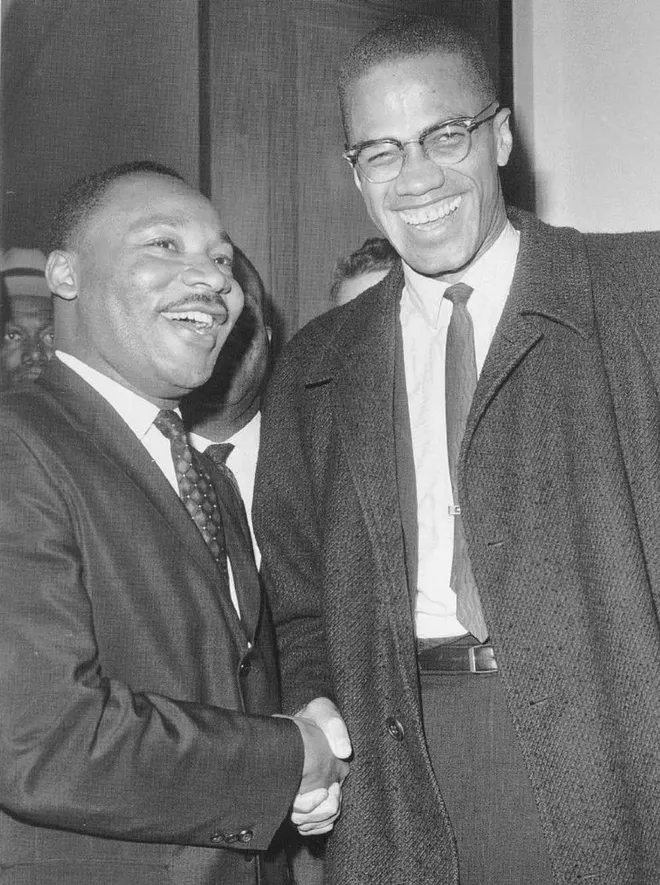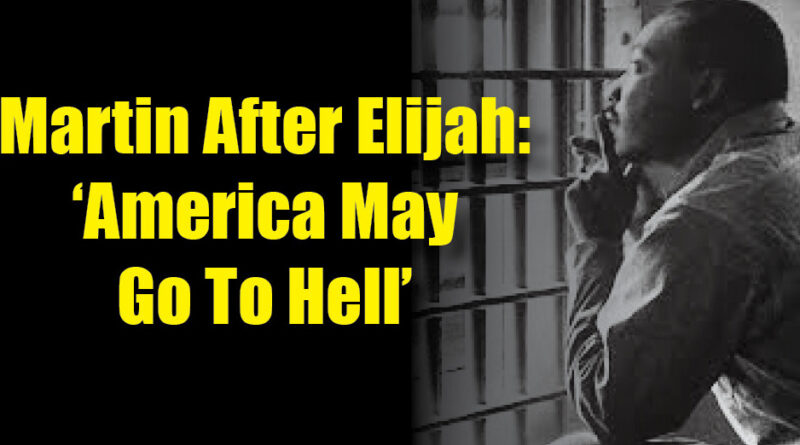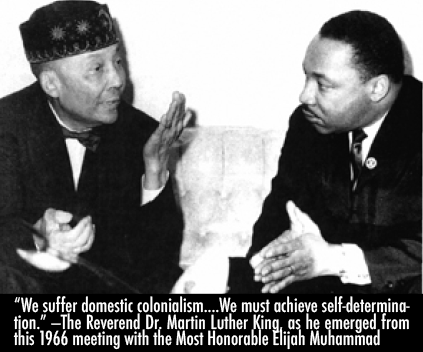Martin After Elijah: ‘America May Go To Hell’
NOI Research Group
The Honorable Minister Louis Farrakhan has asked all people to study the last speeches of the Rev. Dr. Martin Luther King, Jr., and to reflect on the evolution of his message—from one of an integrationist “Dreamer” in 1955 to one of a true wide-awake revolutionary in 1968 when he was murdered. Listen to him here explaining How White People Got Their Land and Wealth:
The world came to know Dr. King during the 1955-56 Montgomery Bus Boycott, in which he proclaimed his earnest belief that
“We want to love our enemies — be good to them. This is what we must live by, we must meet hate with love. We must love our white brothers no matter what they do to us.”
But by the mid-1960s, it is clear that Dr. King began to consider that The Teachings of The Most Honorable Elijah Muhammad had profound relevance to the struggle for Black freedom in America. Bro. Dr. King and his wife, Coretta, met with The Messenger of Allah at his Chicago home on 24 February 1966. (Below is a list of the public speeches given by Dr. King since that meeting.)
Privately, Dr. King indicated a true shift in his belief that the pursuit of “integration” through “non-violent” civil rights struggle would be the answer to the righteous demands of his oppressed people. In the last days of his life, King confided in his friend Harry Belafonte:
“You know, we fought long and hard for integration…But I tell you, Harry, I’ve come on a realization that really deeply troubles me. I’ve come to the realization that I think we may be integrating into a burning house.”
In 1967, Dr. King asked, “Why does white America delude itself, and how does it rationalize the evil it retains?” He said white people’s belief in the fairness of America “is a fantasy of self-deception and comfortable vanity.”
His indictment of white America grew harsher and was unsparing:
“White Americans left the Negro on the ground and in devastating numbers walked off with the aggressor. It appeared that the white segregationist and the ordinary white citizen had more in common with one another than either had with the Negro.”
Incredibly, he even conceded, “there are points at which I see the necessity for temporary separation as a temporary way-station to a truly integrated society.”
By 1968, Dr. King was unequivocal about the country and the war to which white Americans and many negro leaders were irrevocably faithful:
“And I am sad to say that the nation in which we live is the supreme culprit. God didn’t call America to engage in a senseless, unjust war, as the war in Vietnam. And we are criminals in that war. We have committed more war crimes almost than any nation in the world, and I’m going to continue to say it.”
In his very last speech in Memphis in the midst of the striking sanitation workers on April 3, 1968, Dr. King was speaking of BLACK RETALIATION against the forces of wickedness using “the power of economic withdrawal.” “Up to now,” he taught, “only the garbage men have been feeling pain; now we must kind of redistribute the pain.”
It was the United States government that ended the life of our Brother on that Memphis motel balcony at 39 years of age. His intellectual and spiritual journey into the mind of God may have been nearly complete. Among Dr. King’s personal effects were notes of a speech he was preparing to deliver on that Sunday titled: “Why America May Go To Hell.”
It is TRULY time that we acknowledge the brilliance and evolution of our great Brother, the Rev. Dr. Martin Luther King, and to rescue his legacy from those who would misuse his words to send Blacks into that “burning house.”
This is a video list of Dr. King’s speeches since his meeting with the Most Honorable Elijah Muhammad of the Nation of Islam until his assassination on April 4, 1968:
| February 24, 1966 |
Martin Luther King meets with
|
| March 31, 1966 | MLK’s Remarks to Swedish Audience: Dr. King delivers a speech in Stockholm, Sweden, applauding the nation’s commitment and support of racial justice in America. |
| April 10, 1966 | “Sunday with Martin Luther King, Jr.” Radio Sermon on WAAF-AM Chicago, IL: This copy of Dr. King’s segment on WAAF-AM radio, titled “Sunday with Martin Luther King,” explains the plight of the “Negro” in the South as similar to the oppression experienced by the Israelites in the book of Exodus. |
| June 6: James Meredith was shot and wounded on the “March Against Fear” from Memphis, Tennessee, to Jackson, Mississippi, June 27: SNCC leader Stokely Carmichael publicly uses the militant term, “Black Power” in Greenwood, Mississippi. | |
| June 5, 1966 | “Guidelines for a Constructive Church”: Delivered at Ebenezer Baptist Church, Atlanta, Georgia. |
| April 20, 1966 | Jenner School Parents, Chicago, IL: A rough draft of an address delivered by Dr. King to the parents of Jenner Elementary School located in Chicago, Il. Dr. King advises a plan to counteract deplorable school conditions as well as the misappropriation of tax dollars. |
| June 16, 1966 | Transcripts of Speeches And Statements Along The Meridith March: Dr. King discusses the recent violent challenge faced by Blacks and the SCLC in which they have experienced a “threat of murder.” This issue has motivated Dr. King to continuously press for social change and maintain the governmental responsibilities in Mississippi. |
| June 21, 1966 | Transcript of MLK’s Rally Speech in Yazoo City, Mississippi: In this transcript of Dr. King’s speech to the citizens of Yazoo City, he addresses the issues of poverty and racism within the state. |
| August 6: Dr. King marches on the issue for open housing in Chicago and is stoned by angry onlookers. | |
| July 17, 1966 | A Statement by Dr. King: In Chicago, Dr. King asks for the economic and social betterment of the individuals living in the “slums” of the city. |
| August 8, 1966 | Introduction of Senator Edward M. Kennedy by MLK |
| July 10th, 1966 | Demands of the Chicago Freedom Movement: Dr. King placed a list of demands on the door of the Chicago City Hall in order to gain leverage with city leaders. |
| August 10, 1966 | SCLC President’s Report – MLK: Delivered at the Tenth Annual Convention of the SCLC, Dr. King addresses several elements of the Civil Rights Movement as he discusses the successes, plans, goals, and vision of the SCLC in relation to the wider movement it represents. |
| August 11, 1966 | SCLC Resolution on 1966 Civil Rights Act: At its Tenth Annual Convention, the SCLC Board adopts a resolution calling upon President Johnson and Congress to reverse a vote on Title IV (Open Housing) of the Civil Rights Act of 1966 that effectively permits discrimination in the sale or rental of private housing. |
| October 14, 1966 | Statement by MLK: Dr. King enforces the mission and organizational structure of the SCLC, and the “Black Power” slogan.
Statement on The Negro’s Political and Economic Power: Dr. King discusses the inferior political and economic power of American Blacks against the backdrop of emerging Black Power organizations. He reveals several new non-violent programs the SCLC targeted at economic and social justice: youth training and political reformation in the South. |
| November 6, 1966 | Seventh Annual Gandhi Memorial Lecture: Howard University presents Dr. King as its primary speaker for its seventh annual Gandhi Memorial Lecture in 1966. Dr. King traces the slow but meaningful progress society has made from slavery to the current civil rights movement. |
| November 14, 1966 | MLK Speech at SCLC Staff Retreat: Dr. King addresses the staff of the SCLC at a retreat in Frogmore, South Carolina. He divides his speech into three parts: “whence we have come, where we have come, and where do we go from here.” |
| December 2, 1966 | Statement Regarding Chicago Movement: Dr. King speaks about the Chicago Freedom Movement that is mobilizing to “launch an intensive voter registration” campaign in Black communities. |
| December 6, 1966 | MLK Address to the United Neighborhood Houses of New York: Dr. King focuses on the need to alter the ineffective, piecemeal manner in which the government tries to fight poverty by fighting its symptoms, and instead suggests that the government channel those funds into a new “guaranteed annual income” that will turn non-producers into consumers. |
| December 15, 1966 | Senate Subcommittee on Urban Reorganization Statement: In a hearing on the plight of inner cities, Dr. King focuses on injustices in the urban ghettoes, stating that the problem is not primarily a race issue but an economic one. He calls for a rebalancing of national priorities and links the plight of America’s poor to the squandering of resources on war. |
| December 20, 1966 | MLK Statement Regarding Housing Proposal in Chicago: Dr. King announces a slum area housing redevelopment project in the Chicago areas of Lawndale, East Garfield Park and Kenwood Oakland. |
| January 1967: Dr. King’s fourth book, Where Do We Go from Here? Chaos or Community, is published. | |
| draft of 1967 | “A Journey of Conscience”: Dr. King provides the many reasons he so strongly opposes the war in Vietnam. He writes of how he first felt it was important to remain silent, but gradually felt compelled to speak out, as the U.S. made no initiatives toward peace. He points out that the war abroad takes away our focus on our problems at home, and we must “combine the fervor of the civil rights movement with the peace movement.” |
| February 25, 1967 | The Casualties of The War In Vietnam: Dr. King speaks at a symposium held in Los Angeles, California. He addresses the moral, social, and political causalities that arise as a result of war. |
| March 31, 1967 | Revolution In The Classroom: Dr. King addresses the Georgia Teachers and Education Association about the education of children in the South. He addresses five causes of the recent riots: white backlash, unemployment, discriminatory practices, war, and features peculiar to big cities. |
| April 4, 1967 | Beyond Vietnam: Dr. King discusses seven major reasons for bringing Vietnam into “a field of moral vision,” five things that the government should do to remove itself from conflict with Vietnam, and also encourages those in the churches and the synagogues to speak out against the war in Vietnam. |
| April 9, 1967 | Three Dimensions of a Complete Life: Dr. King states that the key to an extended and fulfilling life is to live a life that is “three dimensional.” He further identifies these dimensions as: “length, breadth and height.” Dr. King proclaims these dimensions will ensure a life of self-love, community and love for God. |
| May 1 – October 1: Summer riots, wherein 43 people are killed. Dr. Martin Luther King makes appeals to stop the riots. | |
| May 10, 1967 | America’s Chief Moral Dilemma – New York: Dr. King’s address to the Hungry Club highlights an array of issues that relate to America’s “Moral Dilemma.” Dr. King explains the three major evil dilemmas that face the nation: war, poverty, and racism. |
| May 29, 1967 | 1967 Geneva Convocation: Dr. King provides introductory remarks to participants of the Pacem In Terris II Convocation held in Geneva, Switzerland. He addresses several moral and political concerns as it relates to war and Vietnam. |
| June 23: Thurgood Marshall is the first Black on the U.S. Supreme Court. | |
| June 18, 1967 | ABC’s Issues and Answers: MLK Interview: Dr. King on the ABC program “Issues and Answers.” They discussed the civil rights movement, Dr. King’s upcoming book, and the U.S. Supreme Court ruling that Dr. King would serve jail time in Birmingham. |
| July 26, 1967 | Joint Statement on Violence in the Cities: Dr. King, A. Philip Randolph, Whitney M. Young Jr., and Roy Wilkins issue a joint statement urging Black Americans in cities to end the public disorder and rioting. The civil rights leaders emphasize the potential damage the urban riots pose to “the Negro population, to the civil rights cause, and to the entire nation.” |
| August 11, 1967 | MLK Addresses the National Association of Radio Announcers: After returning from a Real Estate Brokers convention in San Francisco, Dr. King expresses appreciation for the influence radio has had in an unrepresented community of uneducated listeners who may otherwise be denied information and economic opportunity. |
| August 27, 1967 | “Why Jesus Called A Man A Fool,” also known as “A Knock at Midnight” (Chicago, Illinois). |
| September 1, 1967 | Speech to the American Psychological Association, Washington, D.C.: Dr. King acknowledges the help that social science can have in the quest of Blacks for equality. He identifies three areas for study: Black leadership, the efficacy of political action, and the psychological and ideological changes taking place in Blacks as a result of a decade of struggle. |
| October 23, 1967 | Dr. King makes a public statement before the National Advisory Commission on Civil Disorder: He addresses five causes of the recent riots: white backlash, unemployment, discriminatory practices, war, and features peculiar to big cities. (MLK Statement Before the National Advisory Commission on Civil Disorders.) |
| October 30, 1967 | MLK Announces The Jail Sentences Stemming from the 1963 Birmingham Demonstrations: Dr. King makes this statement concerning the arrest of himself and other leaders of the 1963 Birmingham struggle. The Supreme Court in 1967 ruled that these leaders unjustly broke the citywide injunction banning demonstrations. Dr. King urges the nation: “Take heed. Do not allow the Bill of Rights to become a prisoner of war.”
MLK Statement Regarding an Attack on the First Amendment: Dr. King addresses violations of First Amendment Rights in this statement on the events that took place in Birmingham, Alabama, in 1963. |
| November 1, 1967 | MLK Address on Racial Injustice, Poverty, and War: Dr. King addresses the French community during his “Racial Injustice, Poverty, and War” speech. He discusses topics such as poverty, politics, war, and the government. |
| November 11, 1967 | The Domestic Impact of the War in America: Dr. King parallels the war in Vietnam to the injustice and violence inflicted on urban-dwelling American Blacks. King implores the government to reassess the nation’s domestic priorities and institute anti-poverty programs so that the Great Society does not deteriorate into a “troubled and confused society.” |
| December 4, 1967 | MLK Announces a New SCLC March in Washington, D.C.: Dr. King announces the SCLC’s decision to lead a non-violent march on Washington protesting the government’s lack of support in providing jobs and income for impoverished Americans. |
| December 24, 1967 | A Christmas Sermon |
| August 15, 1967 | The Crisis in America’s Cities: Dr. King provides an analysis of “social disorder” and a plan of action against poverty, discrimination, and racism in Urban America. Dr. King states that “If the soul is left in darkness, sins will be committed.” |
| February 4, 1968 | “The Drum Major Instinct” (Atlanta, Georgia) |
| March 10, 1968 | “The Other America”: Dr. King delivered this speech that emphasized the need to address poverty, the Vietnam War, and race relations in America. |
| March 18, 1968 | Address at Mass Meeting at the Bishop Charles Mason Temple: King speaks to striking sanitation workers in Memphis. |
| March 20, 1968 | MLK Address at Mass Meeting in Eutaw, Alabama: Dr. King challenges the Black residents of Eutaw, Alabama, to participate in the upcoming SCLC Poor People’s Campaign. In this address, he urges the citizens of Eutaw to occupy Washington, D.C., in an effort to press Congress for a redistribution of wealth in America. He urges, “All ye who are tired of segregation and discrimination, come unto us. All ye who are overworked and underpaid, come unto us.” |
| March 20, 1968 | Speech in Jackson, Mississippi: Dr. King addresses supporters in Jackson, Mississippi, during his statewide tour for the 1968 Poor People’s Campaign. He speaks of his excitement about the number of Blacks in Mississippi that participated in the last congressional election. He emphasizes that the Poor People’s Campaign cannot be successful without a strong coalition of organizations that see the need to combat poverty. |
| March 28: Dr. King leads striking sanitation workers in a march in Memphis, Tennessee. The march erupts in violence. | |
| March 31, 1968 | “Remaining Awake Through a Great Revolution,” delivered at the National Cathedral in Washington, D.C. |
| April 3, 1968 | I’ve Been to the Mountaintop speech: Dr. King delivers the “I’ve Been to the Mountaintop” speech at the Masonic Temple in Memphis, TN. |
| At sunset on April 4, Martin Luther King, Jr., is fatally shot while standing on the balcony of the Lorraine Motel in Memphis, Tennessee. | |
| April 7, 1968 | “Why America May Go to Hell”—planned to be delivered on this date but never was because of his assassination. |

^^


